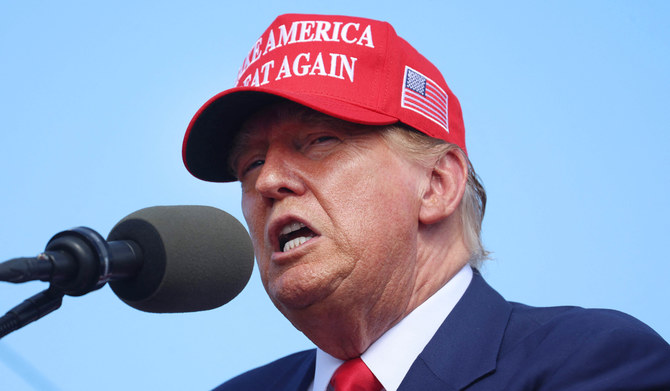MIAMI: Former President Donald Trump said in an interview posted on Thursday he wants to give automatic green cards to foreign students who graduate from US colleges, a sharp departure from the anti-immigrant rhetoric he typically uses on the campaign trail.
Trump was asked about plans for companies to be able to import the “best and brightest” in a podcast taped Wednesday with venture capitalists and tech investors called the “All-In.”
“What I want to do and what I will do is you graduate from a college, I think you should get automatically as part of your diploma a green card to be able to stay in this country. And that includes junior colleges too, anybody graduates from a college. You go there for two years or four years,” he said, vowing to address this concern on day one.
Immigration has been Trump’s signature issue during his 2024 bid to return to the White House. His suggestion that he would offer green cards — documents that confer a pathway to US citizenship — to potentially hundreds of thousands of foreign graduates would represent a sweeping expansion of America’s immigration system that sharply diverges from his most common messages on foreigners.
Trump has blamed immigrants who are in the country illegally for committing crimes, stealing jobs and government resources, and suggested that they are “poisoning the blood of our country.” He has promised to carry out the largest deportation operation in US history if elected.
Trump and his allies often say they distinguish between people entering illegally versus legally. But during his administration, Trump also proposed curbs on legal immigration such as family-based visas and the visa lottery program.
Right after taking office in 2017, he issued his “Buy American and Hire American” executive order, directing Cabinet members to suggest reforms to ensure that business visas were only awarded to the highest-paid or most-skilled applicants to protect American workers.
He has previously said the H1-B program commonly used by companies to hire foreign workers temporarily — a program he has used in the past — was “very bad” and used by tech companies to get foreign workers for lower pay.
During the conversation with “All-In,” Trump blamed the coronavirus pandemic for being unable to implement these measures while he was president. He said he knows of stories of people who graduate from top colleges and want to stay in the US but can’t secure visas to do so, forcing them to return to their native countries, specifically naming India and China. He said they go on and become multibillionaires, employing thousands of workers.
“You need a pool of people to work for your company,” Trump said. “And they have to be smart people. Not everybody can be less than smart. You need brilliant people.”


























